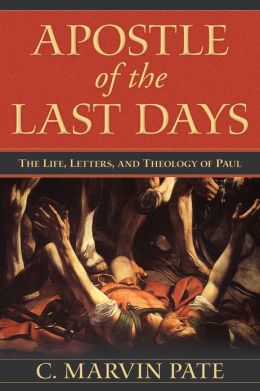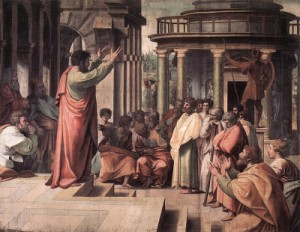 Dr. C. Marvin Pate has written an excellent volume on the theology of the Apostle Paul. It is titled, Apostle of the Last Days. Kregel sent me a review copy, and it is already one of the best books I have read in the past year.
Dr. C. Marvin Pate has written an excellent volume on the theology of the Apostle Paul. It is titled, Apostle of the Last Days. Kregel sent me a review copy, and it is already one of the best books I have read in the past year.
Apostle of the Last Days
I had Dr. Pate as a professor when I was a student at Moody Bible Institute, and really enjoyed his insights into Scripture, his wit, and his quirky personality. I only took him for one or two classes, but consider him to be one of my influential professors from college. He challenged me to really consider the historical and cultural background material of Scripture.
Grammar and word studies are nice, but if you don’t know the history and culture behind a biblical book or passage, you will never really understand what Scripture teaches.
This book by Dr. Pate provides excellent historical and cultural background into the life, thinking, and theology of the Apostle Paul. Though I have not yet read N. T. Wright’s Paul and the Faithfulness of God, this volume on Paul’s theology is by far one of the best on this topic I have found.
Apostle of the Last Days challenged me to read Paul’s letters not just in light of the history and culture of Judaism, but also in the history and culture of Graeco-Roman thinking, and most importantly of all, in light of the eschatological expectations of both groups.
Eh… what?
Let me put it in simple terms:
 Both the Jews and the Romans had hopes and dreams for what would happen at the end of days. Pate shows that Paul wrote to reveal how Jesus fulfills and completes these hopes and dreams.
Both the Jews and the Romans had hopes and dreams for what would happen at the end of days. Pate shows that Paul wrote to reveal how Jesus fulfills and completes these hopes and dreams.
Summary of Apostle of the Last Days
After a chapter of introduction about the views on the theology of Paul and some of the central tenants of Pauline theology, Pate goes letter by letter through the writings of Paul to show how Paul tied together Jewish and Graeco-Roman hopes about what would happen at the end of days, and shows how these hopes were fulfilled in Jesus Christ and the Kingdom of God.
Serious students of Pauline theology must not overlook this important volume by C. Martin Pate. Pate is on to something about Paul’s thinking and theology that is often missed by Pauline scholars: Paul is not only writing a response to Jewish theology, but is also writing a response to Greek and Roman theology, and especially the Imperial Cult of Caesar worship.
It could probably be said that the letters of Paul are not only intended to show how Jesus fulfills the Old Testament prophecies about the Messiah, but how Jesus also fulfills the Graeco-Roman expectations for what Caesar was supposed to be and do.
This is a challenging idea on multiple levels, and if true, the ramifications are far-reaching. As such, Apostle of the Last Days is a critically important book for thinking about Pauline theology and teaching. If you are preaching or teaching on any letter of Paul, I highly recommend this volume. You can get Apostle of the Last Days at Amazon.
I liked this book by C. Marvin Pate so much, it inspired a book idea of my own which I really want to write. First, however, I have to finish with the five books I am already writing… sigh…




Do you know anything about the teaching of the rapture?
Yes. I haven’t written much on it though. Submit a question in the sidebar area on the right, and I might try to write a post about it. Thanks!
When I first seriously read the New Testament, some forty years ago, I was immediately impressed and confused by the difference between what Jesus was reported to have said, and much of what Paul had written in his various epistles. At that time, I didn’t know much about the historical background of the biblical canon. I just sensed the difference in messages. Paul was focused on end-times, the afterlife and a mystical, supernatural, hard to fathom concept of Jesus. Jesus himself had presented none of that (though the church later produced complex interpretations of his very simple message in order to align with Paul’s theology). I focused on the words of Jesus, easy to discern in the red letters printed in my first bible. The message was plain and clear: love for God and fellow man. The kingdom of God is revealed by finding Christ inside you. That’s it, that’s all and that’s enough. I’ve never regretted focusing on Jesus rather than Paul.
Recently I’ve been researching what some people call “the problem of Paul.” There’s a wide range of information and opinion available, from moderate, informed and thoughtful to emotional, misguided and extreme. One book I found helpful was “The Jesus Dynasty” by James Tabor. A website I recently found which seems to agree fairly well with my own conclusions is 30ce.com.
I’ll certainly read “Apostle of the Last Days” as soon as my local library gets it.
I think a critical re-examination of Paul’s place in Christianity is long overdue and necessary to the inauguration of the Kingdom of God as Jesus taught it.
I need to study this further. Right now, I think that we have either misunderstood Paul or Jesus (or both), but when properly understood, both will be in perfect agreement with each other.
I’ve just begun re-reading one of my late husband’s workbooks/textbooks from Christ For The Nations. This book explains the differences in the way people thought all through the ages since the Bible was written. There are Nine periods of history in which people in different cultures, locations on earth, times, thought very differently from each other regarding The Bible. For example there was the Roman Age, the Middle Ages, The Renaissance, The Reformation, The Revolutionary Age, Scientific Age, The Age of Non-Reason, The Age of Fragmentation, and the Age of Personal Peace and Affluence. The book is How Should We Then Live? –The rise and decline of Western thought and Culture, by Francis A. Schaeffer.
That Schaeffer book is excellent and was formative in my own thinking as well.
The development of the New Testament is better understood when approached chronologically rather than in the order in which it was arranged by church fathers hundreds of years later. Then even the gospels, which many people mistakenly think of as being older than the Pauline writings, can be seen to be greatly influenced by ‘Paulism’. I’ve found two books to be helpful in clarifying this: “Paul and Jesus”, by James D. Tabor, and “The Mythmaker”, by Hyam Maccoby.
The New Testament only casually addresses the teachings of Jesus. Its content derives primarily from the experience of Paul on the road to Damascus, and its inherent theology is developed from that. The Sermon on the Mount and the parables were the main substance of the first N.T. gospel, Mark, and of the inferred, earlier gospel known as “Q”. Those teachings are seldom alluded to in the Pauline writings. The teachings of Jesus were also the primary content of the Gospel of Thomas and similar writings which were rejected, prohibited and even destroyed by the early church fathers.
Paul’s vision was probably a genuine mystical experience, though he may not have fully understood it. It seems that for the most part, his followers didn’t.
That’s not surprising, because as William James pointed out in “The Varieties of Religious Experience”, two of the defining qualities of mystical experience are noetic quality and ineffability. In plain English, they contain insights into depths of truth not attainable by logic and reason, and the experiences cannot be adequately described in words.
Paul’s writings indicate that he understood the concept of the indwelling Christ, which was probably the basic revelation in his vision. However, his own interpretation of his experience was undoubtedly colored by various factors such as personal history and Jewish messianic expectations, possibly combined with elements of Hellenistic mystery religions with which he would certainly have been familiar. At any rate he seems to have borrowed from Greek, Roman and Egyptian religions to add to his theology, perhaps to make it easier to sell to his target audience of Gentiles.
If Paul did not fully understand his experience, his followers and the early church fathers understood it even less. They almost completely ignored and forgot the Christ within, focusing instead on the ideas of blood-sacrifice for atonement, virgin birth, divinity and physical resurrection, all of which are irrelevant distractions from the principal teaching of Jesus about unity with the Father and the Kingdom of Heaven. What’s more, they reinterpreted as much of the Old Testament as they could to make it seem predictive of their new theology. This resulted in the outrageous assertion that the Jews never properly understood their own scriptures until the Paulists appeared on the scene to explain them.
I haven’t finished reading The Mythmaker yet, but both books seem to discount Paul’s mystical experience completely, which I think is a mistake. I believe that Paul did actually experience the Christ. But the fact that he may have had such an experience does not make his writings, nor the subsequent writings of his followers, inerrant; nor does it mean that he was a ‘saint’. In fact, as can be seen in some of his epistles, even after his vision Paul was often not Christ-like, and certainly no ‘saint’!